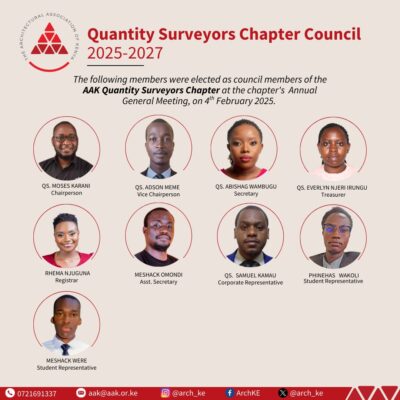Quantity Surveyors Chapter
Modern construction is complex
Design of building is subject to functional, dimensional, technological and financial constraints. It requires a team, which brings together men of varied training and experience – Architects, Quantity Surveyors, Engineers and builders.
The Quantity Surveyors is a key member of the construction team-the essential link between the client who commissions the building, Architects and Engineer who design it and the builders who builds it. He is the expert on construction costs and communication and his services are used from the inception of a project its completion.
The Quantity Surveyor’s major skill is in the analysis of design cost relationship. He also advice’s on, and controls, the budget as well as dealing with contract procedures and documentation and the financial administration of construction contracts.
Experts cost advice is essential. It is no use designing a building which meets the functional, dimensional and technological requirements of the brief, and is aesthetically satisfying, but which the client cannot afford
Training
Registered Quantity Surveyors qualify by taking the examinations of the Board of Registration of Architects and Quantity Surveyors (BORAQS). All candidates must have a level of academic attainment equivalent to that required for university entrance.
Training normally takes place over a period of about five years, and consists of full time education and practical experience leading to the professional qualification.
However, today, greater emphasis is placed on full-time education often through a university degree, and this takes place over a period of a minimum three years followed by a period of practical experience, obtaining substantial exemption from the Institution’s examinations.
What does a Quantity Surveyor do?
Historically, the quantity survey originated from the old measure of building work; hence surveyor of quantities of building work, or Quantity Surveyor. Today, however, the role of the modern Quantity Surveyor is much more comprehensive and varied, and with a different emphasis.
The Chartered Quantity Surveyor is a specific professional whose training and experience are directed towards the planning and control of expenditure on construction of all kinds, including effective means of accounting for it.
His knowledge of construction economic enables him to:-
- Advise on what project would cost;
- Advise on the size and standard structure that can be erected for any given expenditure;
- Advise on the economics of a project and the preparation of a budget;
- Co-operate with the designers to ensure that a building can be erected within an approved expenditure;
- Advise on tendering procedures and contractual arrangement;
- Prepare documents for obtaining tenders and arranging a contract;
- Exercise financial control during the construction so that the budget is not exceeded without authority;
- Act with the Architect and Engineer to ensure that the financial provisions of the contract are properly interpreted and applied so that the client’s financial interest is safeguarded and that the constructor is paid a proper price for the work.
A service to Clients
The service which a Chartered Quantity Surveyor would normally provide to a client are:-
- Preliminary cost advice and cost planning
- Advice on type of contract
- Advice on obtaining tenders
- Preparation of tendering document
- Negotiation with contractors
- Cost control and preparation of financial statements
- Valuation of work process
- Settlement of their final cost with the contractor and sub-contractors
Cost Advice
Preliminary cost advice is given by the Quantity Surveyor at the very outset of a scheme, even before the Architect’s drawings are prepared. The Quantity Surveyor indicates the probable region of cost of a proposed project or he may assess the type and size of structure that ca be erected for any given expenditure. Armed with this information and with estimates of maintenance and running costs, the Quantity Surveyor assists his clients in the preparations of the budget for the project.
Once the preliminary drawing have been prepared, he prepares a more detailed approximate estimate and this cost advice enables design decisions to be made with full knowledge of their financial implication to the client.
Cost Planning
Every client wants value for money. Value for money not only in respect of the capital cost, but also in respect of future running and maintenance costs. The Quantity Surveyor has evolved a technique known as cost planning which enables his cost advice to be used objectively during the design process on every aspect of the structure.
Cost planning involves a systematic analysis of the structure which enables the price for each constituent to be valued against its performance requirements and aesthetic considerations. After the initial feasibility studies and preliminary estimates have been prepared, the Quantity Surveyor prepares the cost plan from the Architect’s preliminary drawings. The cost plan divides a building into its various functional elements and allocates cost to these elements. In this way it is possible to ensure a proper appointment of expenditure over the various elements. Proposals for alternative materials and designers are costed as the design progresses and the cost implications are presented to the client and other consultations are made with the knowledge of the overall cost involved.
Tendering Documents
The most usual forms of contract in construction works are based on the use of Bills of Quantities as contract documents. Bills of Quantities are the transaction of the designers drawing and specification into words and quantities. They enable each contractor tendering to estimate his price on exactly the same basis as his competitors. Bills are prepared in accordance with methods of measurement in use throughout the building and Civil Engineering industries in Kenya.
The Bills are later used during the construction of a project to provide a basis for the financial management of the contract. Where other forms of tendering procedures are used bills of quantities may be a modified form, or may be replaced by schedule of prices. The Quantity Surveyor ensures that such documents are drafted in the form most suited to the circumstances.
Obtaining Tenders
Tenders for constructional work may, be obtained either in competition or by negotiation. Choice of the most suitable procedure is one of the most important decisions to be taken at any early stage and one of the matters on which the Quantity Surveyor’s advice is most valuable.
He can advise on the selection of suitable firms to be invited to tender, according to the type and size of a job and the general standard of workmanship and skill that may be required. When tenders have been obtained, the Quantity Surveyor checks them to see that no substantial errors have been made, ensuring that no contract is entered into on the basis of a seriously incorrect quotation. He then submits a detailed report on the tenders to the client.
The advice the Quantity Surveyor gives in the selection of contractors an obtaining tenders is also applied to the choice of nominated subcontractors and supplies, and obtaining quotations from them.
Cost Control
When full cost has been prepared in the design stages, the Quantity Surveyor will use it as a basis for cost control during the construction process. During construction, variations in the work are often necessary; sometimes to take account of the client’s changing needs, sometimes to overcome site conditions which could not be foreseen, such as the presence of underground obstructions. The Quantity Surveyor estimates the cost of proposed variations and reports their impact on the probable final cost, so that corrective steps may be taken elsewhere in the work, if the client requires, to keep the cost within the budget.
As part of this systematic control of the cost during the progress of the work, the Quantity Surveyor will prepare at regular intervals financial statements which keep client and designers fully informed of the up-to-date financial position and the anticipated final cost of the work.
Valuation of Work in progress
Under most forms of building or civil Engineering contract, the contractor is paid each month for the work he has done during the preceding month. It is the Quantity Surveyor’s duty to measure and value work carried out during the period in question, together with the value of any variations which may have been authorized, and to submit to the Architect or Engineer a recommendation regarding a payment on account. If the Architect or Engineer is satisfied that the work involved has been carried out in accordance with the terms of the contract, he will certify the amount due to the contractor in accordance with the Quantity Surveyor’s valuation.
The Final Account
The Quantity Surveyor’s duties end with the calculation for the final cost. This is achieved by preparing a final account for the work in which the contract sum is adjusted in accordance with the terms of the contract to take account of any variations or adjustments in the accounts of nominated subcontractors and suppliers and of any other matter for which the contract allows.
The final accounts are agreed with the contractor and provide a fair and equitable settlement in accordance with the contractor conditions. The Quantity Surveyor will also prepare any analysis of the final account which the client may require.
The Future
Today the construction industry has become a more complicated business and prospective owners of new buildings are seeking ways of getting the job done in the most speedy, economical and efficient way.
Quantity surveying firms have made full use of computers and sophisticated mechanized techniques in the preparation of bills of quantities and in cost analysis. The use of computers is now also being used extended to earliest design of projects where alternative solutions are evaluated at great speed and with accuracy in terms of design, quality and function as well as both capital cost and anticipated running costs after completion.
The prospective owner needs expert and impartial advice. He needs it particularly on matters of cost and building methods and it is in this field that the role of the Quantity Surveyor has become more important as a professional consultant. As well as the more traditional roles mentioned above, Quantity Surveyors are offering financial advice on Engineering services in buildings, and there is a growing tendency for clients to appoint independent Quantity Surveyors on large Engineering contracts.
New and wider opportunities are also being opened to Quantity Surveyors and many are already making contributions in fields such as: project co-ordination; environmental economics and social accounting; cost Engineering; and production and resources control. Project Co-ordination includes responsibilities for the economic and financial control of construction, coupled with the concern for tendering, contract procedures and the effective overall control of the building team.
Environmental economics and social accounting are concerned with the implications of planning decisions on society in the widest sense. The Quantity Surveyor’s skills and specialized knowledge can be applied to financial decision techniques such as cost benefit analysis which have evolved over recent years.
Cost Engineering comprises the measurement, analysis and control of cost in respect of special plants and other Engineering installations.
Production and resources control: The quantity surveying profession is presently moving into a period of change in that advice sought before design is commenced. Clients require Quantity Surveyors to provide firm estimates at this stage and to bear the responsibility for advice on which financial commitments and other decisions are made. The pre-design commitment can express cost in terms of performance and space-use, and may be on a cost-in-use basis taking into account capital costs, cost of repairs, maintenance and replacements ad running costs. Such duties require knowledge of the market and the distinction between cost and price and these become more important with the likely introduction of contactors into the design process at an earlier stage than at present. Further, Quantity Surveyors advise about the relative merits of alternative forms of package deals or of systems of construction.
In the meantime, Quantity Surveying skills have come into full play in construction project management.
Traditionally, Quantity Surveyors have played a leading role in Arbitration and all forms of dispute resolution.
Quantity Surveyors Chapter Representatives

